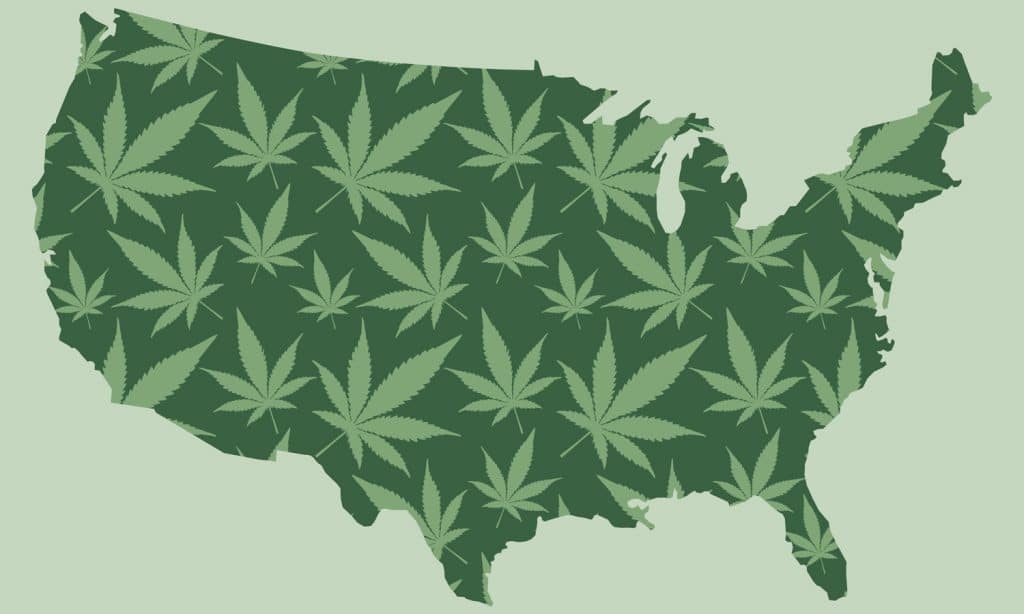Legalization could mean millions of dollars for the states as the growth of the supply chain will open multiple opportunities.
The growth of medical marijuana has seen the trend of legalization and opening of new markets prevalent in recent years. Some states that were not leaning towards legalization have greater chances of success this year. The surprise is these 4 red states could legalize weed in 2021. The traditionally conservative states are considering allowing medical marijuana programs in Alabama, Kansas, Kentucky, and South Carolina.
A paradigm shift has been taking place carefully since last year and 2021 could help solidify that shift. Many Southeastern states are leaning towards following the trend of Mississippi with respect to marijuana legalization. Likewise, states that normally lean towards the Republican view of things are already embracing cannabis. 2020 showed this reality as Montana and South Dakota legalized medical and recreational marijuana use in November. This makes it 38 states with Washington DC that have medical marijuana programs infused in their state health system.
Legalization for these states will do a whole lot of good given the economic and commercial effects of the 2020 pandemic. Legalization could mean millions of dollars for the states as the growth of the supply chain will open multiple opportunities. Jobs will be created for the populace and the states can hugely benefit from the opening of new economic systems and tax opportunities.
Prospects of the new possible markets
Each of the four states has peculiarities in terms of their road to legalization. Kansas already had two medical marijuana bills squashed last year. Nonetheless, the journey of West Virginia to medical marijuana legalization in 2017 leaves much to expect good news in Kansas too. Though the stakeholders in some of these states seem resilient with prohibition, they will have no choice in the face of a decision made by voters. This was the case of Mississippi where voters used the power of the ballot box to incorporate medical marijuana despite resistance from the legislature.
Medical marijuana bills in Alabama and Kentucky were well on their way to approval last year. However, the onset of the pandemic drew things backward yet there is much hope that 2021 will be the breakthrough year. Spencer Duncan, executive director of the Kansas Cannabis Industry Association attests to the fact that some of the lawmakers in Kansas who were uncomfortable with the idea of medical marijuana are now open to the idea. This is why there is much hope in the possibility of Kansas legalizing marijuana when a new bill is passed.

States in the Southeast and Midwest are bound to benefit the greatest with the opening of new cannabis markets. They have the advantage of lower labor costs and real estate costs compared to other regions. They also have limited licensing programs which will affect the ratio of competition to be expected for such licenses. Another advantage heading into legalization will be the technological advancements of such states in the area of agriculture and processing of its products.
Here is a closer look into the four states that could legalize medical marijuana in 2021.
Alabama
The likelihood of Alabama passing a medical marijuana bill in 2021 is very high. The Senate already passed a medical marijuana bill in March 2020 before the pandemic hit. A 22-11 vote in favor of medical marijuana enough to get the bill to the House. However, the effects of the COVID-19 made that hard to do. The same bill is expected to be passed this year by Sen. Tim Melson and the bill is expected to have smooth sailing towards rubber stamping.
RELATED: What Does A Conservative State Medical Marijuana Program Look Like?
The bill in 2020 was tailored to allow licenses to be offered for cultivators, processors, and dispensaries. There is also room for licenses for testing labs and transporters. The bill allowed for pills, patches, creams, and gelatinous cubes. However, there is no room for food products and products that involve smoking and vaping.
Kansas
Kansas has already seen two medical marijuana bills rejected last year, yet this year has started with another bill. The present bill has until May 14 when the legislative session concludes to receive passage. When the medical marijuana bill is passed in Kansas, it is expected to be modeled after the medical marijuana program in New Mexico. Over 25 health conditions are listed under medical marijuana in New Mexico which includes chronic pain and PTSD. Kansas is expected to have licenses that will enable stakeholders in the cannabis industry to be well designated and differentiated in the eyes of the law.

Kentucky
Despite the fact that Kentucky has a Republican-dominated House, they passed a medical marijuana bill last year. A difference of 65 to 30 shows how much support the bill had in the house. Nonetheless, the pandemic halted what would have been a momentous victory. The new session runs till March 20 which is sufficient time to pass the bill.
RELATED: Why Southern States Are Still Pushing Back On Marijuana Legalization
The bill from last year allows for state regulators to issue a specified number of licenses for cultivators, processors, producers, and dispensaries. This will enable the proper designation of duty and differentiation. The medical marijuana program will cover conditions such as chronic pain, epilepsy, nausea, vomiting, and multiple sclerosis. The bill allows for flowers to be sold with a capped THC level of 35%.
South Carolina
They already have two medical marijuana bills in the works in South Carolina. One bill is from the house while the other is from the Senate. The house has the less restrictive bill of the two as the legislative session has until May 13 to come up with something positive. The bill by the House allows for products that can be smoked while that of the Senate only allows oils, edibles, and topical products. The two bills allow licenses to be offered to 15 cultivators, 20 processors, and one dispensary for every 20 pharmacies in the state. It should be noted that only the house bill has chronic pain listed among the list of conditions though both bills have over 12 conditions slated to be covered under medical marijuana.


